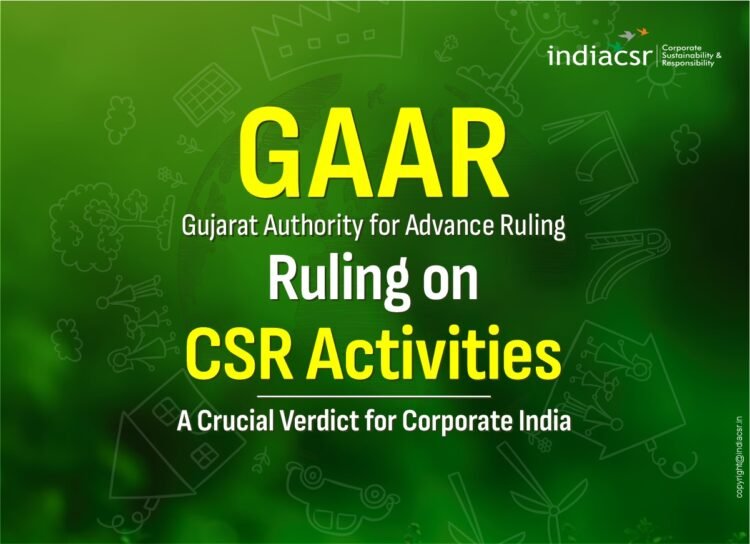Analyzing the Impact of GAAR’s Decision on CSR and GST

NEW DELHI (India CSR): The Gujarat Authority for Advance Ruling (GAAR) has made a significant ruling regarding the eligibility of Input Tax Credit (ITC) on Corporate Social Responsibility (CSR) activities. This decision is pivotal as it addresses the complex intersection of CSR obligations under the Companies Act and the entitlements under the Goods and Services Tax (GST) laws. The ruling has profound implications for how businesses in India approach CSR expenditures and their tax implications.
Adama India Pvt Ltd vs. GAAR: Redefining Corporate Responsibility and Taxation in India
The Evolving Landscape of Corporate Obligations and Financial Duties
The legal tussle between Adama India Pvt Ltd and the Gujarat Authority for Advance Ruling (GAAR) transcends a mere tax dispute, reflecting the dynamic nature of corporate responsibilities and financial commitments in contemporary India. This landmark case promises to redraw the traditional boundaries that separate business expenditures from social responsibilities, potentially inaugurating a new era in corporate governance and tax policy in the nation.
With the unfolding of these legal proceedings, the corporate sector remains vigilant, keenly anticipating the far-reaching consequences this verdict might hold for the future of Corporate Social Responsibility (CSR) and taxation in India.
***
The Legal Framework
The legal framework surrounding CSR in India is unique. The Companies Act 2013 mandates certain companies to spend a percentage of their profits on CSR activities. This integration of CSR into legal obligations blurs the lines between voluntary social contributions and compulsory business expenditures.
***
GAAR’s Stance on CSR Activities
The Core Issue
Adama India Pvt Ltd, a leading agrochemical company, sought an advance ruling from GAAR on whether the inputs and input services procured for mandatory CSR activities, as required under the Companies Act 2013, would qualify as being in the course and furtherance of business and therefore eligible for ITC under the CGST Act.
GAAR’s Verdict
GAAR ruled that CSR activities, as outlined in the Companies (CSR Policy) Rules 2014, are excluded from the normal course of business of the applicant. Consequently, these activities are not eligible for ITC as per Section 16(1) of the CGST Act. GAAR’s decision is grounded in the interpretation that CSR, while mandatory, does not constitute a part of ‘business’ activities as per GST laws.
***
Implications of the Ruling
Legal and Financial Repercussions
This ruling implies that companies undertaking mandatory CSR activities will not be able to claim ITC on expenditures related to these activities. This interpretation could lead to a substantial financial impact on companies, especially those with significant CSR obligations.
Broader Corporate Impact
The decision also raises questions about the broader intent of CSR activities. If CSR expenses are not recognized for ITC, it might influence how companies choose and prioritize their CSR initiatives, potentially shifting focus away from non-business-aligned social activities.
Table of Important Facts:
| Fact | Details |
|---|---|
| Appellant | Adama India Pvt Ltd |
| Authority | Gujarat Authority for Advance Ruling (GAAR) |
| Issue | Eligibility of ITC on CSR Activities |
| Relevant Law | Companies Act 2013, CSR Policy Rules 2014, CGST Act 2017 |
| GAAR’s Ruling | CSR activities are not in the normal course of business and hence not eligible for ITC |
| Implications | Companies cannot claim GST credits on CSR-related expenses |

Impact on CSR Activities
There is also a concern about how such a ruling could impact the nature of CSR activities in India. If CSR expenditures are recognized for ITC, companies might be more inclined to undertake projects that align more closely with their business interests, potentially shifting the focus from pure philanthropy.
Setting a Precedent
This legal challenge by Adama India Pvt Ltd could set a significant precedent for how CSR expenses are treated under GST law. A ruling in favor of the company might encourage other businesses to claim ITC on their CSR spends, potentially leading to substantial changes in corporate financial strategies.

Brief History of the Case Involving Adama India Pvt Ltd and GAAR
The case involving Adama India Pvt Ltd and the Gujarat Authority for Advance Ruling (GAAR) revolves around the eligibility of Input Tax Credit (ITC) for Corporate Social Responsibility (CSR) activities. Here’s a timeline detailing the key dates in this legal matter:
1. Advance Ruling Requested: Adama India Pvt Ltd approached GAAR seeking clarity on whether the expenses incurred on CSR activities, as mandated under the Companies Act 2013, were eligible for ITC under the GST framework. This request was formally noted as Advance Ruling No. GUJ/GAAR/R/114/2021.
2. Date of Advance Ruling: The initial ruling by GAAR was passed on 11.08.2021. This ruling determined that CSR activities, although mandatory, did not fall within the ‘course or furtherance of business’ for the purposes of GST, and thus were not eligible for ITC.
3. Appeal Filed by Adama India Pvt Ltd: Disagreeing with GAAR’s ruling, Adama India Pvt Ltd filed an appeal. The date of this appeal is recorded as 22.10.2021.
4. Personal Hearing Dates: The case progressed to the stage of personal hearings, which were crucial in the appeal process. The dates for these hearings were set for 06.01.2023 and 26.01.2023.

Company Overview of Adama India Pvt Ltd
Based on the information provided in the attached document, here is a profile of Adama India Pvt Ltd:
Adama India Pvt Ltd is a key player in the agricultural sector, specializing in the supply of insecticides, fungicides, and herbicides. The company is headquartered in Bharuch, Gujarat, India, with its office located at Plot No. D-21/1, GIDC Estate, Dahej Tal-Vagra, Dahej, Bharuch-392130, Gujarat.
Corporate Social Responsibility (CSR)
Adama India Pvt Ltd is committed to fulfilling its CSR obligations as per Section 135 of the Companies Act 2013. The company has been actively involved in various CSR activities, including donations to government relief funds, educational societies, civil works, installation of plant and machinery in schools and hospitals, distribution of food kits, etc. These activities demonstrate the company’s commitment to contributing to societal development and welfare.
Legal Challenges
Adama India Pvt Ltd has been at the forefront of a significant legal challenge regarding the eligibility of Input Tax Credit (ITC) on CSR activities under the Central Goods and Services Tax Act 2017 (CGST Act). The company appealed against a ruling by the Gujarat Authority for Advance Ruling (GAAR), which stated that CSR activities, as per the Companies (CSR Policy) Rules 2014, are not in the normal course of business and therefore not eligible for ITC.
Financial and Tax Implications
This legal case has significant financial and tax implications for Adama India Pvt Ltd and the broader corporate sector in India. The company’s argument is that since CSR activities are a statutory requirement, they should be considered in the course and furtherance of business, thereby qualifying for ITC under the CGST Act. The outcome of this legal proceeding could potentially reshape corporate financial strategies and CSR activities in India.
Corporate Philosophy
Adama India Pvt Ltd’s approach to CSR and its legal challenge against the GAAR ruling reflect its philosophy of integrating social responsibility into its business model. The company believes in going beyond compliance to make a meaningful contribution to societal well-being and environmental stewardship.
An Overview of Gujarat Authority for Advance Ruling (GAAR)
The Gujarat Authority for Advance Ruling (GAAR) is a statutory body established under the Goods and Services Tax (GST) framework in India. It plays a crucial role in interpreting tax laws and providing clarity on various aspects of GST to taxpayers.
Function and Role
GAAR’s primary function is to give advance rulings on specific queries related to GST. These queries can be about the applicability of a tax rate, classification of goods and services, or admissibility of input tax credits. The authority’s rulings provide legal clarity and help businesses in tax planning and compliance.
Jurisdiction and Authority
GAAR operates within the state of Gujarat, addressing the queries and concerns of taxpayers registered or operating within the state. Its rulings are binding on the applicant and the jurisdictional tax authorities, regarding the specific case for which the ruling is sought.
Significant Decisions
GAAR has been involved in several important decisions that have shaped the interpretation and implementation of GST in Gujarat. One such notable ruling is the decision on the eligibility of Input Tax Credit (ITC) for CSR activities, which has had significant implications for businesses undertaking CSR initiatives.
Impact on Businesses
The decisions of GAAR have far-reaching implications on the business community. By providing advance rulings, GAAR assists businesses in understanding their tax liabilities and obligations better, ensuring compliance with GST laws.
You Learn
A New Paradigm for CSR and Taxation
GAAR’s ruling on the ineligibility of ITC for CSR activities marks a pivotal moment in the intersection of corporate responsibility and taxation in India. This decision not only impacts the financial strategies of companies but also prompts a re-evaluation of the role and nature of CSR activities in the corporate sector. As companies navigate this new landscape, the ruling could lead to a recalibration of CSR strategies, potentially reshaping the fabric of corporate social responsibility in India.
***

About the Author
Rusen Kumar is the Founder and Managing Editor of India CSR, a pioneering and largest knowledge dissemination platform focused on the domain of Corporate Sustainability and responsibility (CSR).
Copyright@IndiaCSR
Also Read








